WIPO shapes global copyright protection in key ways:
- Manages international copyright agreements
- Hosts policy discussions on copyright issues
- Helps countries develop aligned copyright laws
Key WIPO initiatives:
- WIPO Copyright Treaty extends protection to digital works
- WIPO for Creators educates artists about their rights
- WIPO Connect helps manage rights and royalties
WIPO’s impact:
| Area | Impact |
|---|---|
| Legal Framework | Implements treaties like Berne Convention |
| Digital Challenges | Addresses AI and copyright issues |
| Creator Support | Provides education and skill-building |
| Enforcement | Works with law enforcement |
WIPO focuses on updating laws for the digital era, supporting developing countries, and tackling AI copyright challenges.
Related video from YouTube
WIPO‘s Main Copyright Tasks
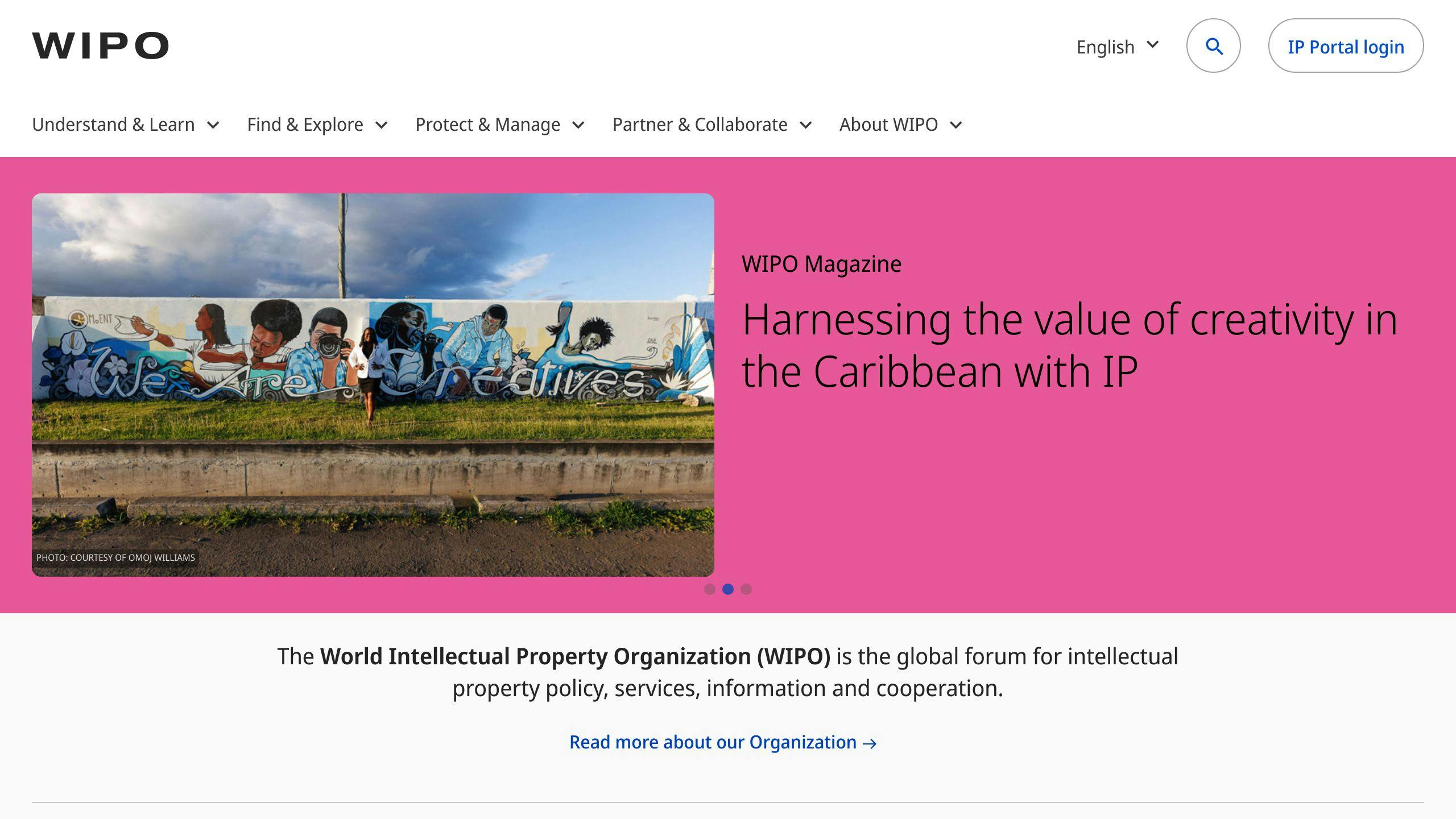
WIPO shapes global copyright protection through:
Managing International Copyright Agreements
WIPO oversees 26 treaties, including the WIPO Copyright Treaty (WCT). The WCT extends protection to:
- Computer programs
- Databases
- Digital rights
This ensures authors’ rights in the online world.
Hosting Copyright Policy Discussions
WIPO’s Standing Committee on Copyright and Related Rights (SCCR) brings together:
- WIPO member states
- Observers
- Organizations
They tackle issues like:
- Copyright limitations and exceptions
- Broadcasting rights
- Copyright in digital environments
WIPO also launched talks on IP and AI, leading to:
- Public consultation
- 250+ submissions
- Revised Issues Paper on IP and AI
Helping Member Countries with Copyright
WIPO aids its 193 members by:
- Providing technical help
- Offering training
- Sharing best practices
This helps create balanced copyright systems worldwide.
Major WIPO Copyright Treaties
WIPO manages key treaties shaping global copyright laws:
The Berne Convention
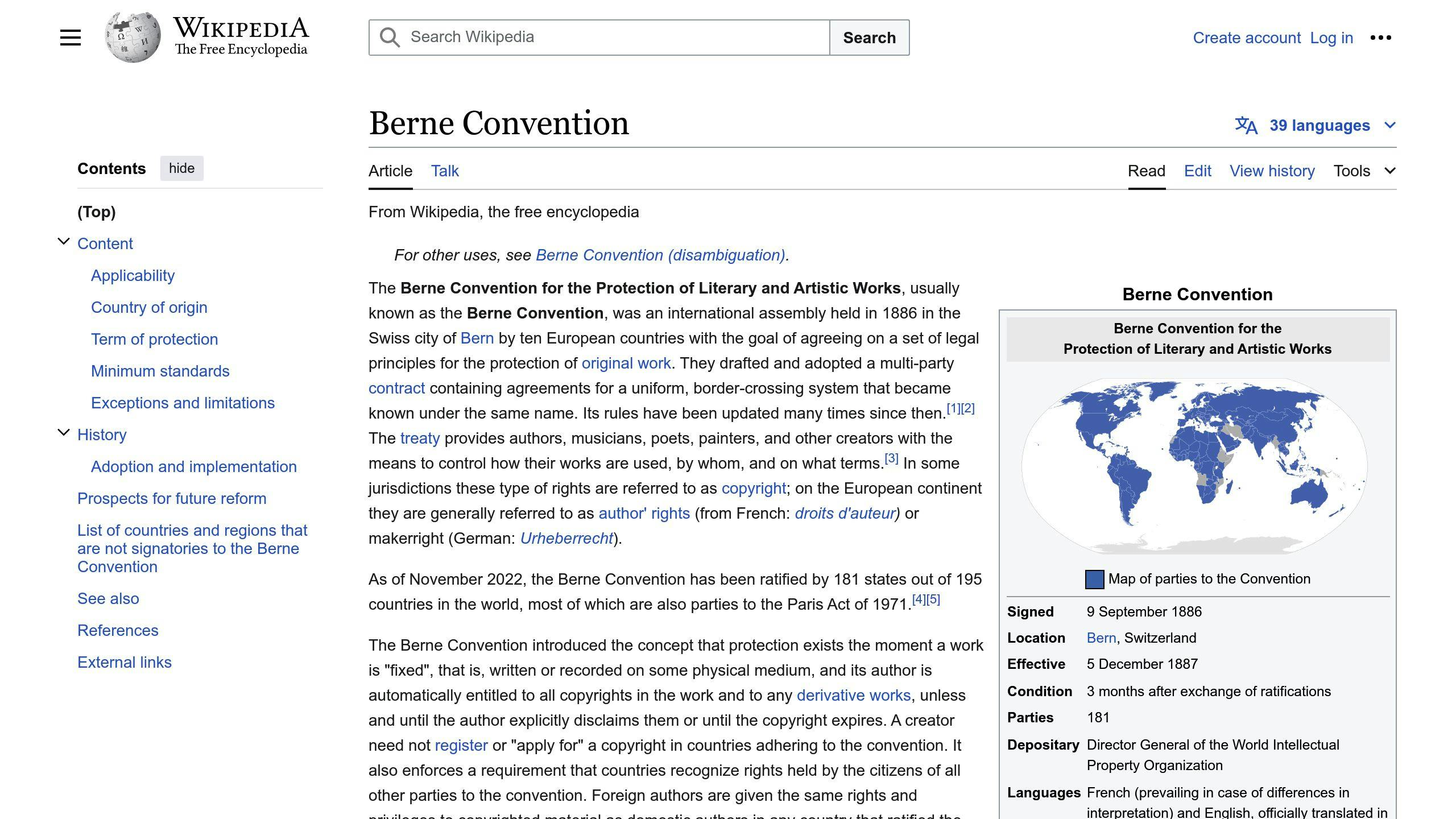
Adopted in 1886, it establishes:
- National treatment
- No formalities for protection
- Independent protection
It sets minimum standards, including 50-year protection after author’s death.
WIPO Copyright Treaty (WCT)
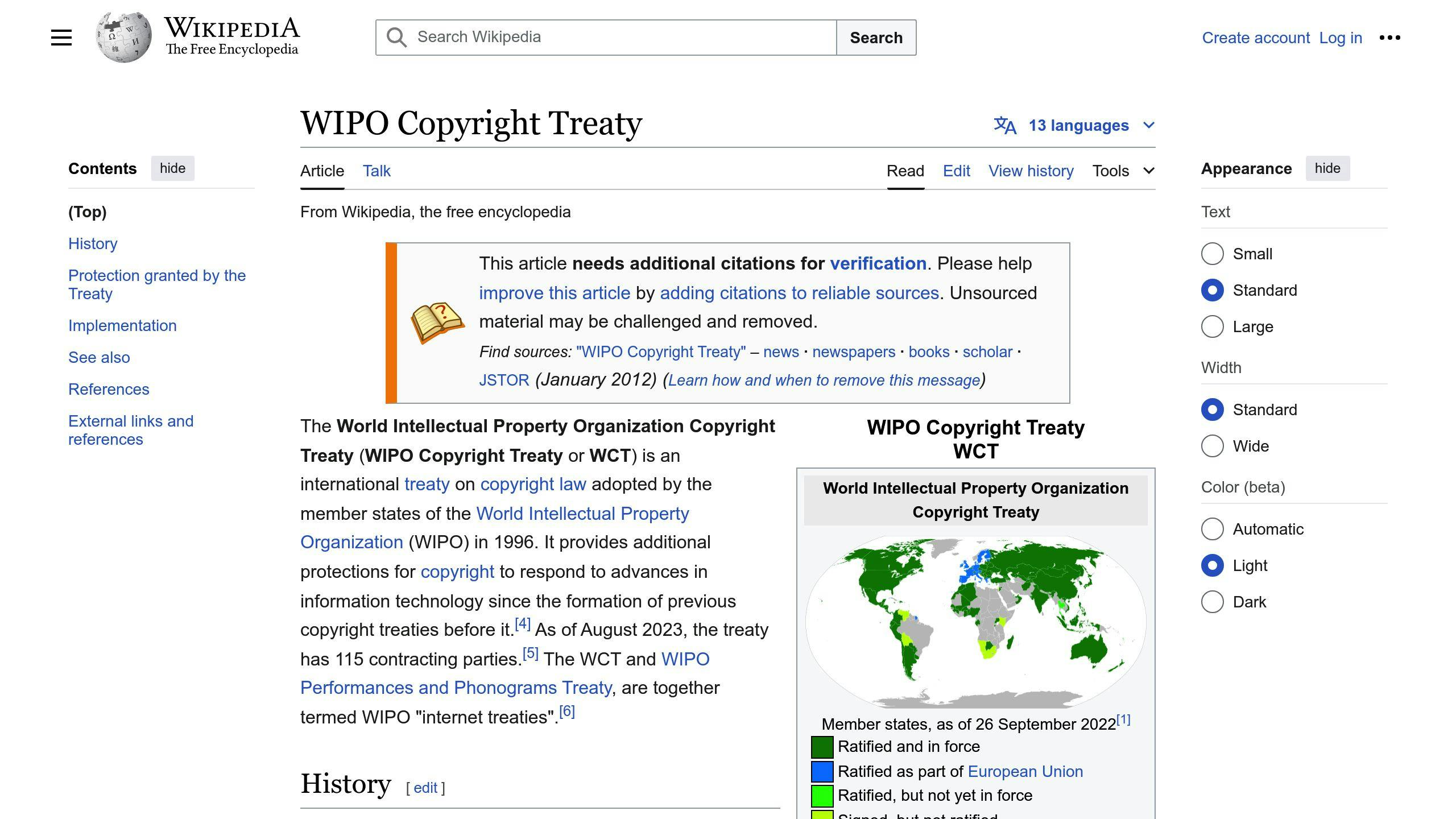
Effective from 2002, it covers:
| Subject | Rights |
|---|---|
| Computer programs | Distribution |
| Databases | Rental |
| Digital works | Communication |
It requires legal protection against bypassing technological measures.
WIPO Performances and Phonograms Treaty (WPPT)
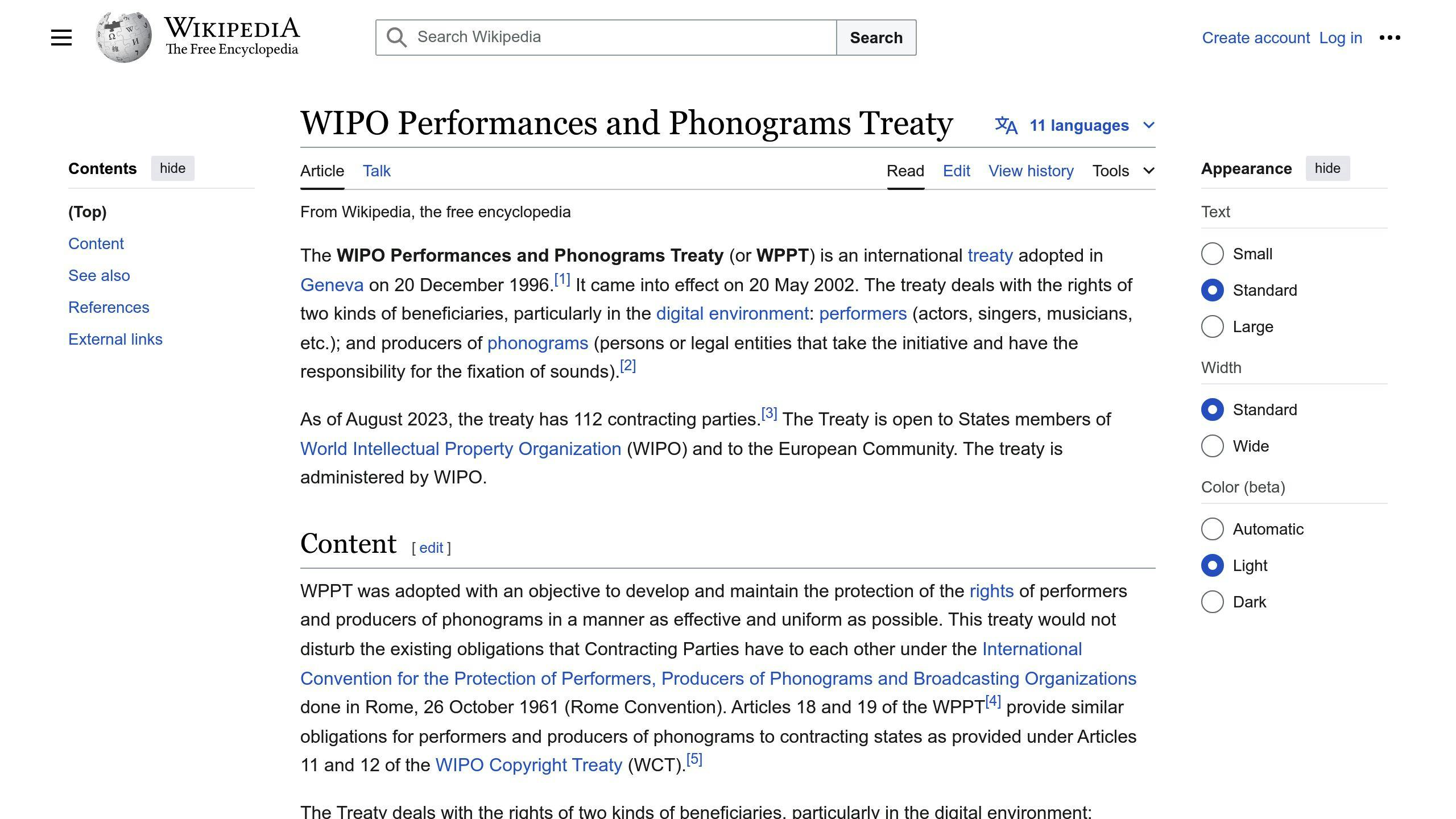
In force since 2002, it grants:
- Performers: Attribution and integrity rights
- Producers: Reproduction, distribution, rental, and availability rights
As of 2004, 43 countries joined, including the USA and Japan.
These treaties create a framework balancing creator rights and public access in the digital world.
How WIPO Shapes Global Copyright Law
WIPO influences copyright law through:
Helping Countries Agree on Copyright
WIPO manages key treaties:
| Treaty | Year | Features |
|---|---|---|
| Berne Convention | 1886 | 164 members, automatic protection |
| WIPO Copyright Treaty | 2002 | 88 members, covers digital works |
| WIPO Performances and Phonograms Treaty | 2002 | Protects performers and producers |
WIPO balances interests, like allowing compulsory licenses for education in developing countries.
Tackling New Digital Copyright Problems
WIPO addresses:
- Online streaming rights
- Temporary copies debate
- Digital marketplace effects
In 2021, WIPO studied global digital music markets and business models.
Making Copyright Laws More Similar Worldwide
WIPO aims for uniform protections through:
- Minimum standards in treaties
- Policy discussions
- Global copyright research
They’re currently surveying universities about online education copyright.
WIPO’s Help for Content Creators
WIPO offers tools for creators:
Copyright Education and Information
The WIPO Academy provides:
- Online courses in multiple languages
- Face-to-face training
- Specialized courses
IP4Youth&Teachers helps educators teach IP concepts.
Skill-Building Programs
WIPO offers:
| Program | Description | Audience |
|---|---|---|
| Executive Training | Advanced IP courses | Business leaders, policymakers |
| Distance Learning | Online IP courses | General public, students |
| University Partnerships | Joint degrees | Graduate students |
| Summer Schools | IP workshops | Students, young professionals |
Many offer scholarships for developing countries.
Solving Copyright Disagreements
WIPO’s Arbitration and Mediation Center provides:
- Mediation
- Arbitration
- Expedited arbitration
By 2006, WIPO handled 47 arbitrations and 44 mediations.
sbb-itb-738ac1e
WIPO’s Copyright Enforcement Work
WIPO enforces copyright globally through:
Improving Copyright Protection Methods
Key treaties:
- WIPO Copyright Treaty (WCT)
- WIPO Performances and Phonograms Treaty (WPPT)
Both require:
- Basic creator rights
- Protection against bypassing tech measures
- Ban on altering rights management info
Working with Law Enforcement Groups
WIPO collaborates with:
- Building Respect for IP Division
- NGOs and international organizations
WIPO ALERT cuts funding to piracy sites:
| Feature | Description |
|---|---|
| Purpose | Share infringing website info |
| Function | Master list of country lists |
| Users | Advertisers avoid illegal sites |
| Participation | 15 countries joined |
Creating Good Copyright Enforcement Practices
WIPO offers:
- Alternative Dispute Resolution
- Resources for legal professionals
- WIPO ALERT Database
These tools help enforce copyright laws effectively.
WIPO’s Digital Copyright Management Projects
WIPO tackles digital copyright through:
The WIPO Connect System
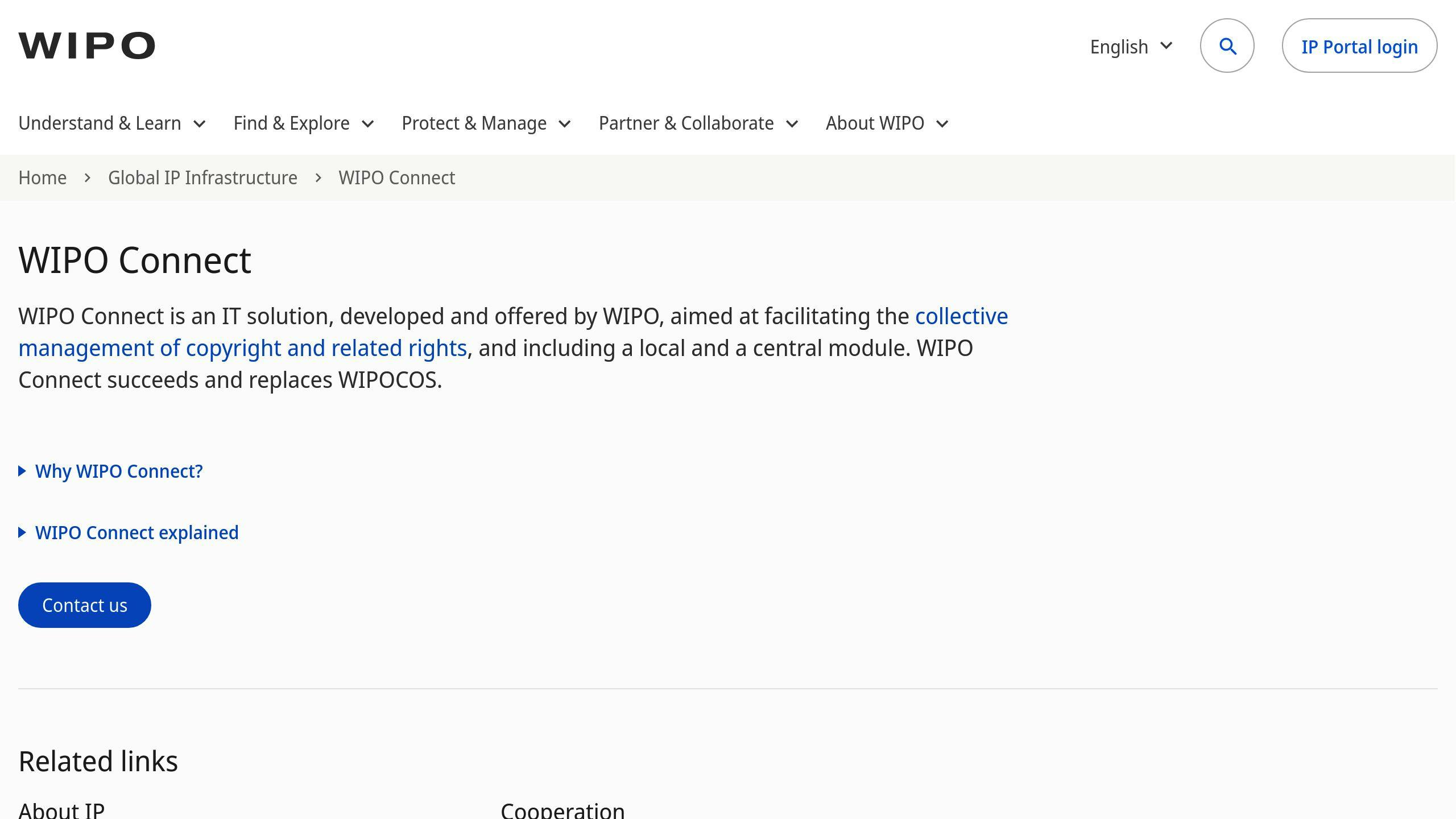
WIPO Connect helps developing countries manage rights:
- Multi-purpose application
- Manages copyright and related rights
- Ensures timely royalty distribution
WIPO and CISAC agreed to support CMOs using WIPO Connect in 2023.
Using Blockchain and AI for Copyright
WIPO explores blockchain for:
| Application | Benefit |
|---|---|
| Ownership records | Tamper-proof records |
| Smart contracts | Automated royalties |
| Tokenization | IP asset securitization |
WIPO PROOF provides tamper-proof timestamps for digital files.
Solving Online Content Sharing Issues
WIPO offers:
- Tailored Alternative Dispute Resolution
- Expert Determination Rules for Online Platforms
- Digital Copyright and Trademark Infringement service
These help resolve issues like AI-generated content disputes and online copyright infringement.
WIPO’s Approach to Fair Copyright
WIPO balances creator rights and public access:
Copyright Access for Education and Research
WIPO focuses on:
- Fair use guidelines for academia
- Cross-border educational resource sharing
- Digital copyright in e-learning
The 2013 Marrakesh Treaty allows accessible format reproduction for visually impaired users.
Supporting Fair Use of Copyrighted Works
WIPO backs fair use through:
| Initiative | Purpose |
|---|---|
| SCCR Discussions | Address copyright limitations |
| WCT Implementation | Extend digital exceptions |
| Development Agenda | Focus on developing countries |
The WCT allows new digital exceptions.
Meeting Developing Countries’ Copyright Needs
WIPO:
- Helps create growth-supporting laws
- Provides fair use policy assistance
- Encourages knowledge sharing
The 2007 Development Agenda aligns IP laws with social and economic goals.
WIPO’s Teamwork with Other Global Groups
WIPO collaborates globally:
Working with UNESCO, WTO, and Others
Key partnerships:
| Organization | Focus |
|---|---|
| WTO | TRIPS Agreement |
| UNESCO | Copyright education |
| WHO | IP and health |
The WIPO-WTO agreement covers law sharing and technical help.
Shared Projects and Programs
- WIPO for Creators: Helps creators understand rights
- Accessible Books Consortium: Increases accessible format books
- Pat-INFORMED: Provides medicine patent info
Aligning Global Copyright Policies
WIPO works on consistent policies through:
- WHO-WIPO-WTO cooperation on health and IP
- Expanded technical help for health tech access
- Software development for rights management
These efforts shape worldwide copyright practices.
WIPO’s Future Copyright Plans
WIPO tackles new challenges:
New Copyright Protection Trends
WIPO examines AI-created works:
- Should AI content get protection?
- Who owns AI-created work rights?
Upcoming Copyright Challenges and Chances
Key issues:
- Adapting to tech changes
- Dealing with deep fakes
- Balancing interests
WIPO’s Plans for Future Copyright Work
Goals:
| Goal | Plan |
|---|---|
| Update laws | Implement new treaties |
| Support developing countries | Boost cultural economies |
| Improve collective management | Strengthen frameworks |
| Address AI challenges | Lead IP and AI discussions |
WIPO works with groups like OpenAI to use copyrighted material responsibly in AI.
Conclusion
WIPO shapes global copyright law, tackling digital-age issues and balancing creator rights with public access. Their work impacts creators, businesses, and users worldwide.
Key areas:
| Area | Impact |
|---|---|
| Legal Framework | Treaty implementation |
| Digital Challenges | AI and copyright discussions |
| Creator Support | Education programs |
| Enforcement | Improved protection |
WIPO focuses on updating laws, supporting developing countries, improving rights management, and addressing AI challenges.
Global teamwork is crucial for WIPO’s success in tackling cross-border issues like online piracy and fair use in the digital age.

